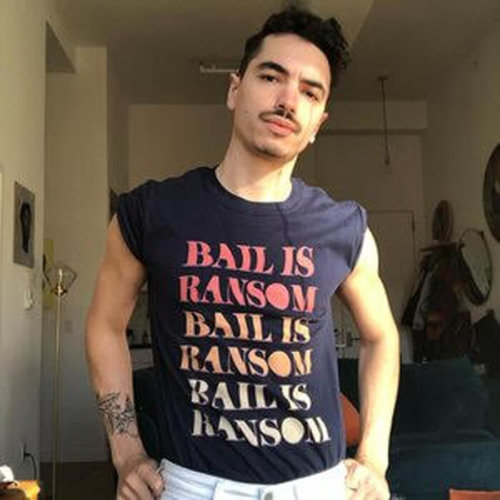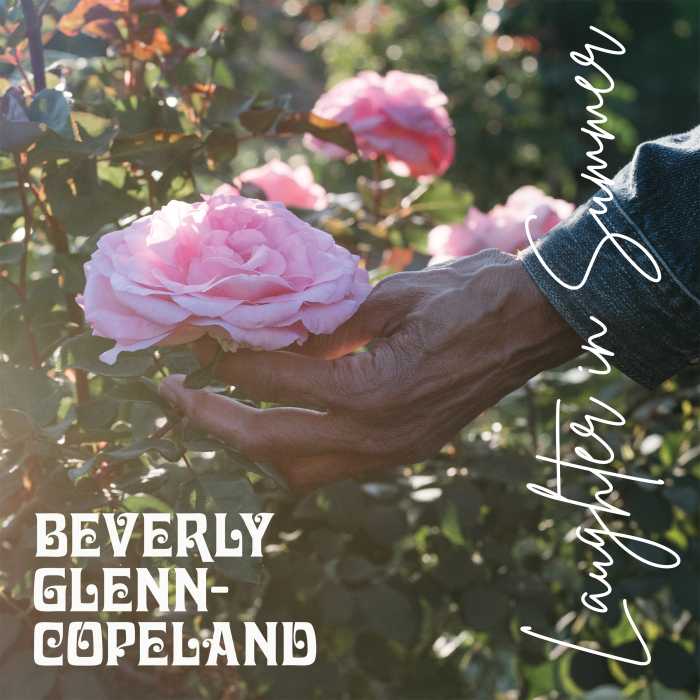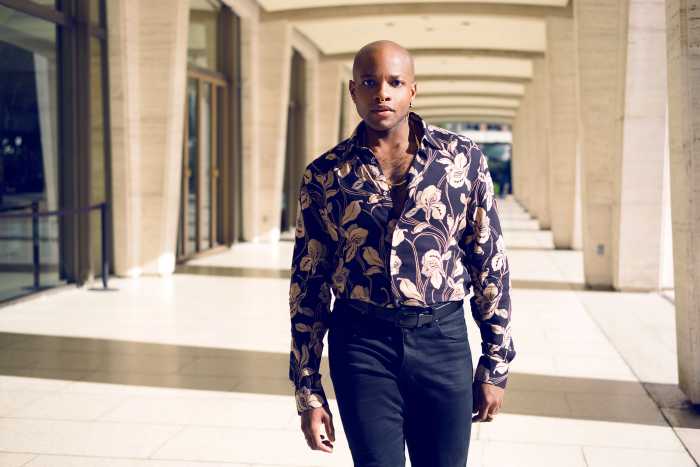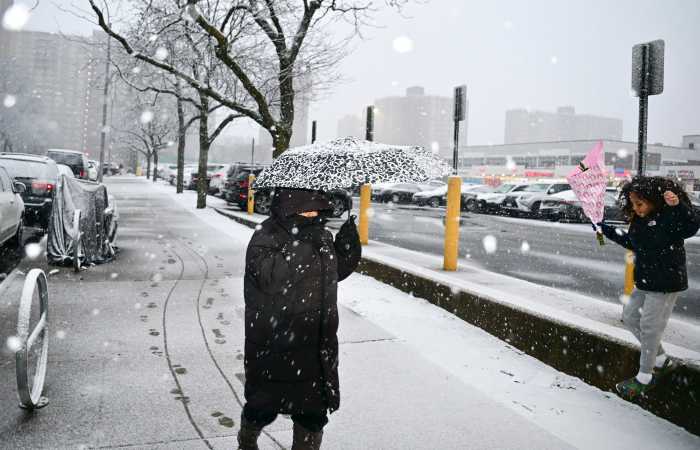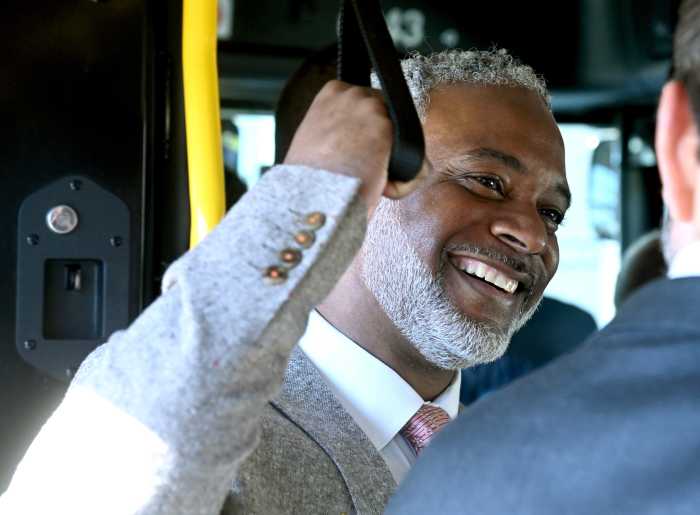Nadav Schwartzman is a queer artist and graphic designer who was born 32 years ago on the outskirts of Tel Aviv.
Nadav now lives and works in New York City and plans to renounce his Israeli citizenship. He describes himself as white, Ashkenazi, “mostly cisgender — and mostly cis-Jewish. I’ve accepted my Jew curls, which makes my partner very happy.”
Nadav paints oil portraiture on wooden boards. One of his latest paintings is autobiographical: a naked male youth against a swirling red sky looks defiantly at the viewer as he pours from a small pitcher a dark liquid. This is “Ganymede,” based on the Greek myth of the young Trojan prince whom Zeus, king of the gods, swept off to Mount Olympus and took as his lover. Zeus gave Ganymede the exalted position of cupbearer to the gods, and eventually placed him in the heavens as the constellation Aquarius.
In most tellings, Zeus banishes Ganymede to protect him from Zeus’s jealous wife, Hera. But Nadav has painted Ganymede based on another version. Here, Ganymede looks down from Olympus onto the Trojan War and is horrified at the slaughter of his family and friends. He tries to avenge them by pouring out the nectar that gives the warmongering gods their immortality.
“There are no perfect victims,” Nadav writes, describing the painting. “Ganymede holds power too. Instead of [accepting] rape, Ganymede is doing what is within his power to protect his loved ones. It’s a futile action … but he still is willing to accept what punishment he would face.”
Power intertwines personally and geopolitically. Nadav tells me he comes from “an extremely Zionist household.” And an abusive one: “I grew up seeing my father berate my mother constantly.” His mother’s mother fled to Palestine from Czechoslovakia in the 1930s to escape the Holocaust; his father’s family traces its roots in the land back four generations. Nadav’s grandparents devoted their lives to the creation of Israel, settling into the neighborhood for Israeli Army personnel where Nadav grew up. And as he grew up, Nadav was only subliminally aware of the dynamics surrounding him. Here is Nadav speaking from his own perspective about his upbringing, his identity, art, and more:
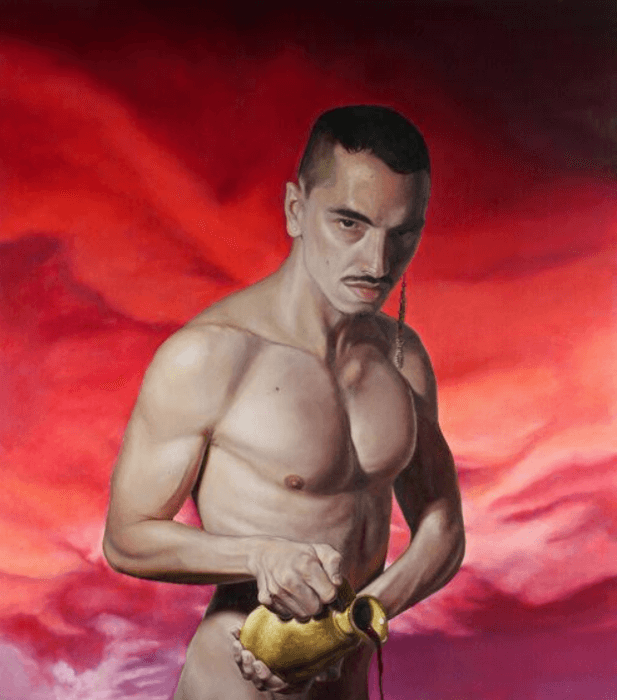
NADAV SCHWARTZMAN: I didn’t understand what apartheid was; it took awhile because you’re not taught. In school, you learn about the War of Independence; you don’t learn about the Nakba and what happened to the Palestinians. Just like in the US, you’re not taught. In An Indigenous Peoples’ History of the United States, Roxanne Dunbar-Ortiz talks about that false ideology: the land was empty; whoever was there was mismanaging it. I was taught that ideology. It’s basically a one-to-one comparison with Israel.
I grew up secluded from Palestinians. Maybe I was in the second grade or younger, I remember my mother telling me how there’s a country in the north that will never want peace. Why would she not even mention Lebanon by name? I remember I was super-young and outside my white grandfather’s house. There were Black people gardening there. I remember my father taking me to wash my hands after saying hello to them.
Apartheid works well in creating walls. I had no Palestinian friends; the second Intifada happened when I was in high school. You’re constantly told Palestinians are the enemy; they’re dangerous. But Israel is not only a white supremacist structure against Palestinians; Israel has within it a hierarchy where Ashkenazi Jews are at the pinnacle. Then you go down the ladder to the Mizrahi, Sephardic, Yemeni Jews, all the way to Ethiopian Jews. We can talk about how they were sterilized, forced to change their names…
Growing up there, I had a hard time with people calling me Jewish. I did not like that. I remember I was in seventh grade and just as I decided I’m an atheist, I was forced to do my bar mitzvah. Since leaving Israel, I’ve developed a more welcoming notion of Jewishness and how I define myself as Jewish.
When my father found out I was gay — by looking through my computer — he wanted me to go to a sex therapist because “one good f*** would cure me,” and to a therapist who could “cure away the gay.” I’m also the only member of my family not to serve in the Israeli military. At the time I was supposed to enlist, I was severely depressed — it’s the best thing that’s ever happened to me. I wish I could say I took more of a stand, but military service was very important to my father, so being able to get out of it through mental health reasons was a way to stand up to him and the IDF.
I was reading an article on pinkwashing the other day that reminded me of this Israeli dating website I used to use. Profile after profile — like 80 percent of people — said basically that if you didn’t serve in the IDF, then I’m not interested in you.
Similarly, here in the States, people will say, “masc 4 masc.” Like, if you’re an effeminate gay, I’m not interested. That’s a lot of internalized homophobia.
I always resented, “Oh you’re from Tel Aviv, the Gay Haven!” That’s pinkwashing bullshit. I’ve also had experiences in the States, where I’ve been fetishized for being Israeli: “Israeli men are so hot.”
Apartheid turns you on? That’s interesting.
I’ve linked #SaveSheikJarrah to my Twitter handle, but I am not the one to talk on Palestine. You need to listen to what Palestinians are saying now. Mohammed El-Kurd, this Palestinian poet whose family’s facing eviction in Sheik Jarrah, says that there’s more understanding now of what’s happening in Palestine, because there’s more understanding of how Black people are treated in the US. Angela Davis also makes the connections super clear. But there are better people than me to talk about the Right of Return in Israel — also in the United States.
What do I feel when I talk about this? I feel shame. That’s part of my family legacy and complicity. And I feel rage — I’m not very articulate at the moment. But there are protests, actions happening now. You just have to keep talking about it. Don’t let this disappear.
Sometimes I’ve had these crystal-clear, AH-HA moments. Like, a year ago, protesting George Floyd’s murder, I saw an NYPD cop car on fire. I thought: This is a painting. Deciding to give up my Israeli citizenship was another AH-HA moment. Part of settler colonialism is winning the demographics. That’s why they don’t allow Right of Return for Palestinians. Renouncing my Israeli citizenship is a way to get at that.
Yes, I’m renouncing it in the USA, capital of settler colonialism. I just got my US citizenship today, in fact. Nothing is perfect. I still have to file the paperwork and I’m not terribly excited about having to go talk to Israelis. But it just feels right, that simple action. No art. I don’t think I’m sacrificing much, so I don’t want to make much of it. It’s just for my soul.

